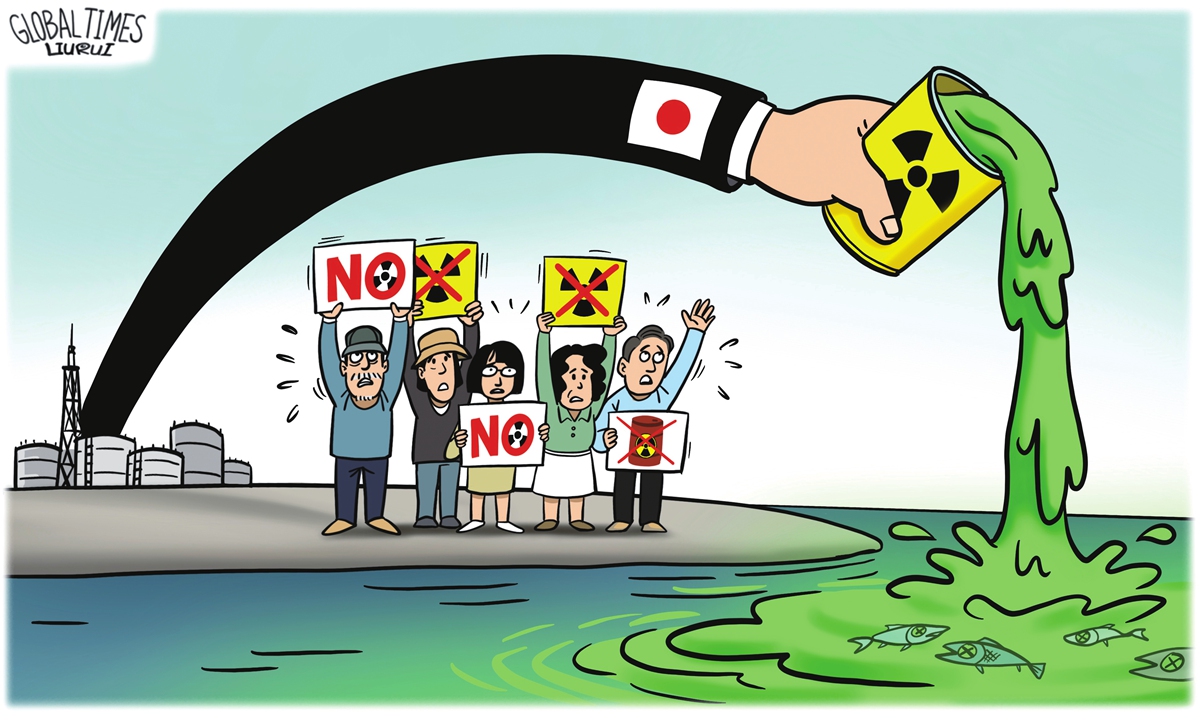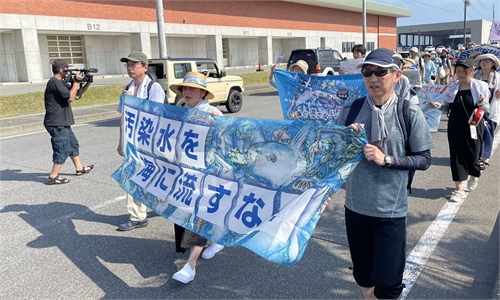Kishida likely to carry on dumping plan regardless of wide opposition
Tokyo's irresponsible move a global issue beyond borders

Japan's dangerous move.Illustration:Liu Rui/GT
Japan's Prime Minister Fumio Kishida paid a visit to Fukushima nuclear plant on Sunday before the Japanese government makes a final decision to set a date to start the controversial dumping of nuclear-contaminated wastewater into the sea, despite wide opposition from home and abroad.
During the site visit, Kishida checked the offshore location of the outlet to the tunnel that is expected to carry the nuclear-contaminated wastewater. After the meeting with Tokyo Electric Power Company(TEPCO)officials, Kishida told media that his government as a whole will make decisions about the timing of the dumping based on the status of efforts to ensure safety and deal with harmful misinformation, according to an NHK report on Sunday.
The Japan Times said Kishida will meet with his ministers on Tuesday to discuss when to start dumping the nuclear-contaminated wastewater. Media reports said late August or early September is most likely.
Some Japanese internet users said that having conversations with the locals are nothing more than a drama performed by Kishida which was completely unconvincing. If the water that is being treated by TEPCO's Advanced Liquid Processing System (ALPS) is actually safe, then Kishida should swim in it. Some said they were disappointed that no matter how much the fishing industry is against the plan, they will eventually succumb to the Japanese government.
Observers reached by the Global Times said the Japanese government will most likely break its promise to carry on its nuclear-contaminated wastewater dumping plan, regardless of wide opposition and concerns. They stressed that as a global issue that reaches beyond borders, the dumping plan should not continue as it has failed to receive full understanding and support from people at home and abroad.
Hideyuki Ban, a Japanese nuclear expert and co-director of the Citizens' Nuclear Information Center (CNIC), told the Global Times on Sunday that the fishing industry has always opposed the dumping plan, as when the radioactive water is dumped it is bound to have a huge impact on fishing grounds in Fukushima and its surroundings.
However, as can be seen from measures currently taken by the Japanese government, Japan is likely to break its commitment, ignore opposition from the industry and forcefully push the dumping plan, Hideyuki said.
Hideyuki said, "We cannot agree with the plan and we will take our opposition to the streets and call for more signatures to oppose it until we stop it from happening."
Although we do not know whether the Japanese government will adjust its policies during the potential 30-year dumping process, at present it seems very difficult to stop the government from launching its dumping operation given the government's tough stance, Hideyuki said.
This irresponsible move from Tokyo has caused panic, antipathy, hesitation and suspicion among residents in Japan's neighboring countries and regions, potentially leading to wider repercussions for the country's industries beyond seafood.
Some Chinese mothers reached by the Global Times said they are worried how the planned nuclear-contaminated wastewater dumping would affect the baby products they use regularly, which include but are not limited to disposable diapers, feeding bottles, body oil, prewalkers, and foodstuffs. Many said they would buy domestic products or buy from Western countries.
Japan's cosmetics industry has already been hard hit in the Chinese market, one of its biggest overseas markets. Several Japanese cosmetics companies reportedly suffered slumps in stock prices after increased antipathy toward the dumping plan, observers found.
Kazuteru Saionji, a visiting professor at Higashinihon Kokusai University, told the Global Times that though the nuclear contamination accident occurred in Japan, how to deal with the radiation-contaminated water is a question that transcends borders, and is a major event concerning the national security of Japan as well as other countries.
Kazuteru called for a broader, deeper and long-term investigation into the contaminated water at Fukushima, and said the Japanese government needs to address the concerns at home and abroad. "Just achieving 'safety' on some data, without full understanding and support at home and abroad, means the nuclear contaminated water should not be dumped into the sea without wide approval," Kazuteru said.
According to media reports, South Korea's four main opposition parties - the Democratic Party of Korea, the Justice Party, the Basic Income Party, and the Unified Progressive Party - along with civic groups and religious communities, submitted a petition to the United Nations Human Rights Council (UNHRC) last week, regarding Japan's dumping of nuclear-contaminated wastewater which violates the human rights of neighboring countries.
The four opposition parties expressed their views during a press conference held in the South Korean parliament on the need for the UN to evaluate the impact on neighboring countries of Japan's illegal dumping plans, as the consequences extend beyond the borders of South Korea. The international community should have a correct understanding and should respond to Japan's unilateral and illegal plan.

